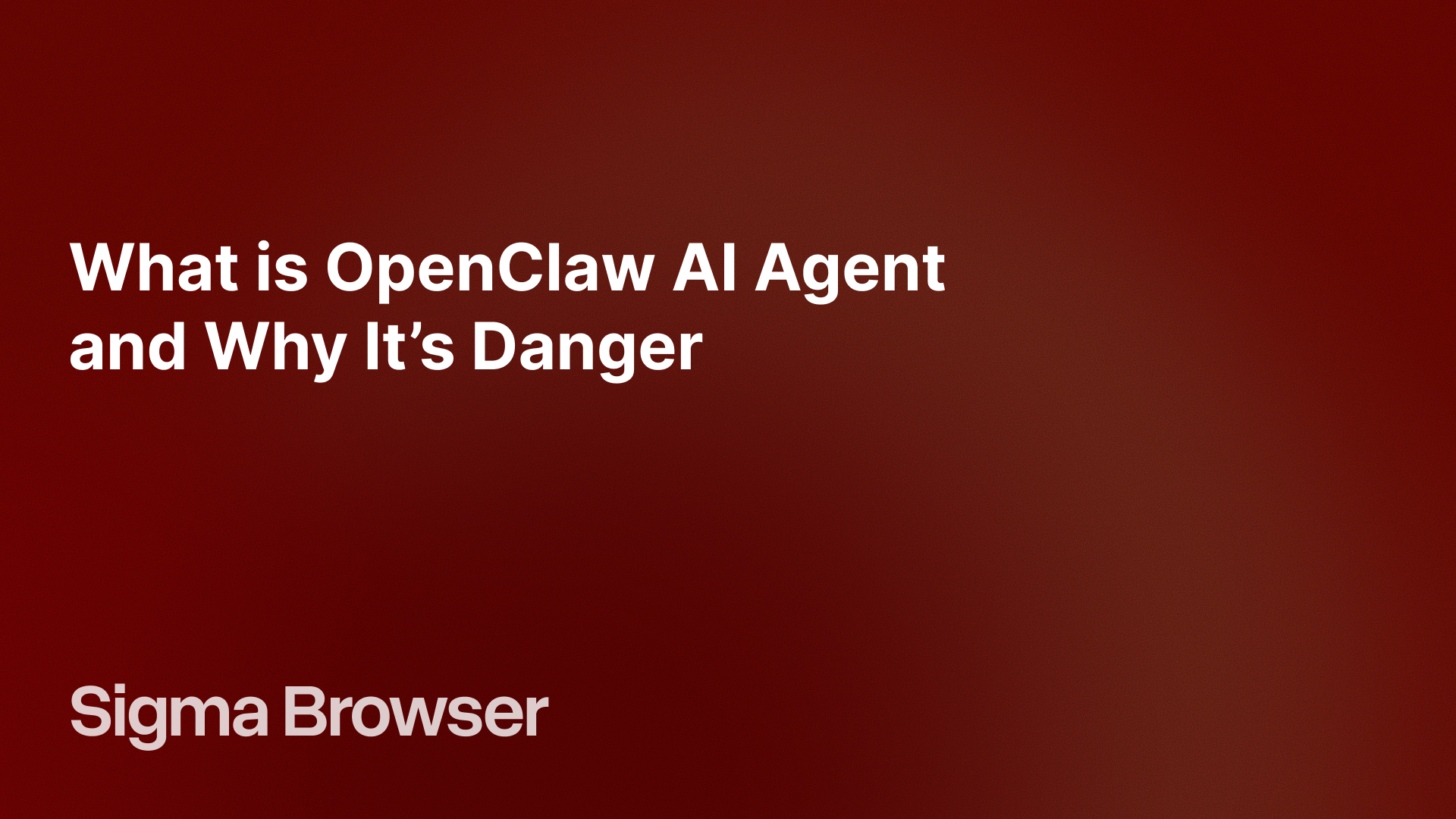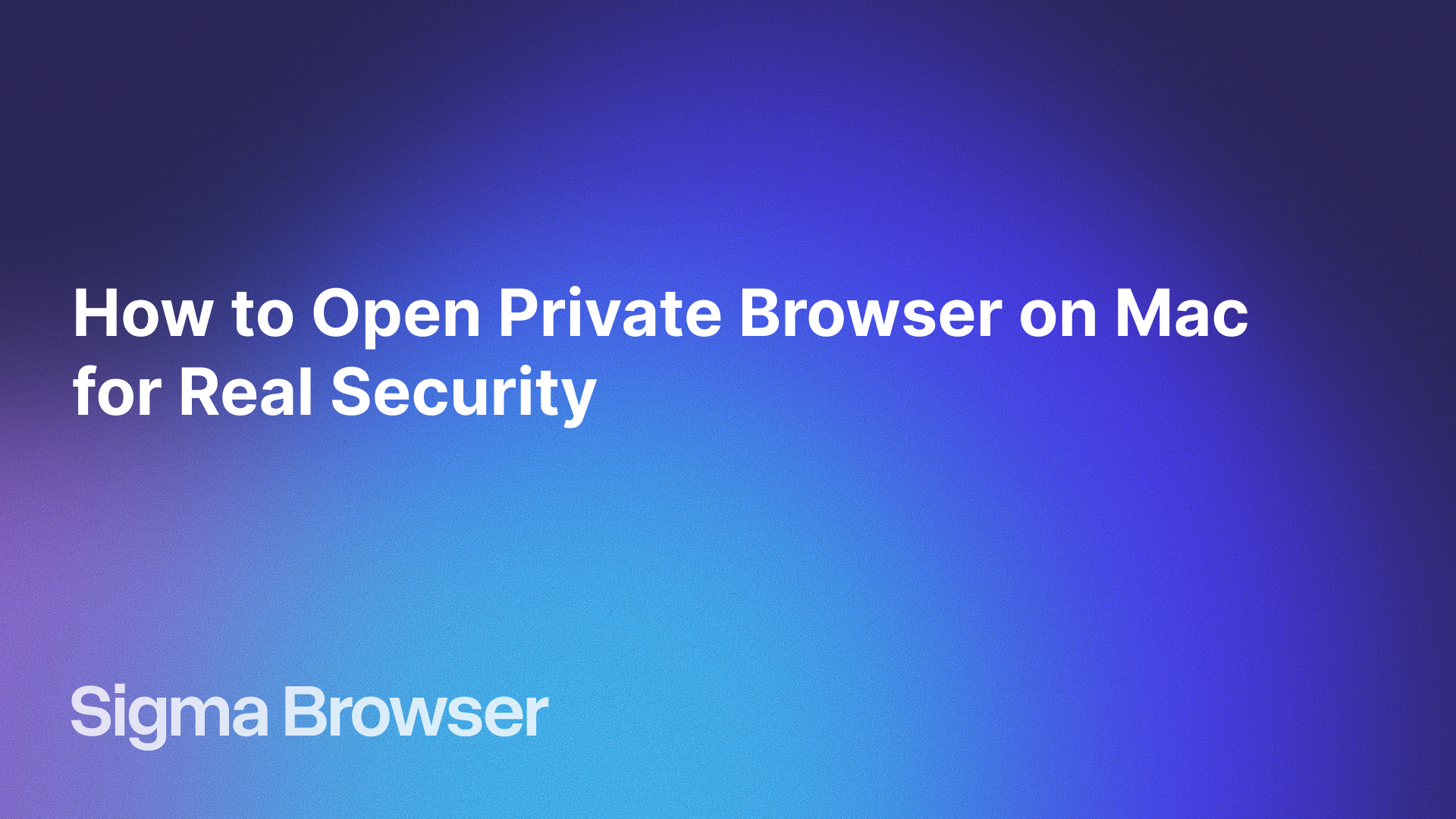I’ve been thinking (maybe overthinking) a lot lately about this whole “AI everywhere” thing—AI chats, AI browsers, AI agents running around doing tasks like caffeinated interns. And honestly… it’s cool, but also kinda terrifying. Because most AI tools today? They know way too much. They store everything. They learn from you in ways you didn’t quite sign up for.
But then something weird happened in 2025: a new category emerged — the privacy AI browser. A browser with a built-in AI agent… that actually doesn’t send your data anywhere.
Yeah. Sounds fake. But it’s real.
And it’s called Sigma AI Browser.
So today I’m diving into what “private AI agents” actually mean — specifically, how Sigma manages to pull off the magic trick everyone else avoided: building a smart AI agent that stores your data locally, keeps working with the internet off, and refuses to track you even if you begged it to.
Let’s unpack this, slightly chaotically.
The Problem With Modern AI Tools (That Nobody Wants to Talk About)
Somewhere around 2023–2024, we all collectively pretended not to notice that AI chats were becoming our second brains… even while openly admitting they absorbed every prompt like a sponge.
OpenAI, Google, Meta — they all collect usage data in some form.
Some anonymized, some not-so-anonymized.
Even “private browsing modes” don’t stop model telemetry.
A Harvard Privacy Lab report (2024) noted that:
“Over 87% of consumer AI services store user interaction logs on remote servers, regardless of user settings.”
And another study by Stanford HAI showed:
“Local-only AI systems reduce data exposure risks by 90–95% compared to cloud-based models.”
So when people started talking about AI privacy browsers, you could practically hear the collective sigh of relief.
The Rise of Local AI Models (The Part the Industry Tried to Delay)
The idea of an AI agent that runs entirely on your device used to sound like science fiction. Too heavy. Too slow. Too unrealistic.
And yet…
In 2025, local models got fast.
Consumer laptops got weirdly powerful.
And someone finally connected the dots.
If the AI runs locally and stores data locally, then nobody — literally nobody — can access it.
Not a cloud provider.
Not a company.
Not a government request.
Not some bored engineer peeking at logs.
Enter Sigma: The First AI Agentic Browser That Works With the Internet Off
Here’s where Sigma AI Browser quietly enters the chat (pun intended).
Sigma launched a new kind of agentic browser — a privacy-first browser with a built-in local AI agent.
Not in the cloud.
Not half-local, half-cloud.
Fully local.
And here’s the wild part:
You can turn off your Wi-Fi, open the AI chat inside Sigma, and it still works.
Tested. Confirmed.
Local means local.
This is why Sigma calls itself an AI privacy browser or local-first AI agent rather than just “another AI browser.”
For reference, the chat is here: https://app.sigmabrowser.com/chat
No server logs.
No chat history being sent to remote machines.
No “we use your data to improve our models.”
Just… your computer doing the work.
Why Local AI Agents Matter (Even If You Think You Don’t Care About Privacy)
Because at some point, an AI agent will know:
- your browsing history
- your passwords
- your work files
- your private conversations
- your research
- your… everything
If that system stores data remotely, even encrypted, someone could eventually access it. Breaches happen. Governments request data. Companies get bought. Terms of service change “silently.” You know the drill.
But if the AI system is built like Sigma — local storage, no cloud syncing, no telemetry — then none of those risks apply.
It’s like having a miniature superintelligence in your laptop that refuses to gossip.
Local AI vs Cloud AI Privacy Comparison
How Sigma’s Private AI Agent Actually Works (Minus the Boring Technical Lecture)
Most browsers that claim to be “AI browsers” are really just wrappers around cloud APIs. They send your prompts → the server replies → they pretend it's magical.
Sigma doesn’t do that.
Sigma uses:
- On-device LLM execution
- Local embedding storage
- Local memory caching
- Local context indexing
- Local encryption
Which means:
- Your ai chat stays on your computer
- Your AI agent never uploads browsing data
- Your preferences never leave your machine
- Your offline mode is not a feature… it’s the default
It’s honestly a bit uncomfortable how refreshing this feels.
Why This Is a Breakthrough (No Exaggeration This Time)
Because until now, the AI industry has been moving in the opposite direction:
More cloud.
More telemetry.
More data centralization.
More “improving the model.”
Sigma goes the other way:
- No tracking
- No remote storage
- No hidden analytics
- No user data on servers
- No “model improvement” collection
This is why people call it:
- a privacy AI browser
- a local AI agent browser
- an AI privacy chat
- an agentic browser without surveillance
Some journalists even call it “the first browser that refuses to spy on you by design.”
Types of AI Browsers (And Which Ones Respect Privacy)
Security Implications: Why Local Models Protect Passwords & Logins
Let’s be blunt:
If a browser uses cloud models to analyze your tabs, the model can theoretically “see” your data.
Sigma avoids this by keeping everything local.
Meaning:
- passwords → local
- cookies → local
- browsing history → local
- AI memory → local
- AI reasoning → local
Even if someone hacked Sigma’s servers (theoretically)…
they wouldn’t find your data. It never touched the server.
This is rare. Like, unicorn-level rare.
Industry Statistics That Make Privacy AI Browsers Necessary
Here are some numbers that basically explain why privacy-first AI agents are inevitable:
- 42% of all data breaches in 2024 were caused by cloud credential leaks (IBM Security Report)
- 89% of consumers say they “don’t trust AI tools with private data” (Pew Research)
- 76% of AI companies admit they collect interaction logs (MIT Tech Review)
- 0% of cloud AI services guarantee no server-side storage
That last number isn’t a typo.
Final Thoughts
Most AI companies today chase scale.
Sigma chases privacy.
It’s weird. Refreshing. Almost rebellious.
A browser that becomes smarter… without tracking you.
An AI agent that helps you research… without uploading your tabs.
A private ai chat that keeps functioning even in airplane mode.
It feels like the future we were supposed to get, but somehow didn’t.
If you want to see what local AI agents look like in reality — not in marketing slides — you can check Sigma here: https://www.sigmabrowser.com/
Just don’t be surprised if it becomes your main browser. Privacy does that to people.
FAQ:
Q: Does Sigma store my AI chat history?
Nope. Everything is local. Delete the app, everything disappears.
Q: Can Sigma’s AI agent read my passwords?
Technically it could, but it doesn’t send anything anywhere, so nobody else can.
Q: How do I know it’s actually local?
Turn off Wi-Fi.
Open AI chat.
It works. End of story.
Q: Is this slower than cloud AI?
Surprisingly, not anymore. Local models in 2025 are fast.
Q: Can third parties request my data?
There is no server-side data to request.
Q: Is Sigma open-source?
Certain components are (and more are coming).















